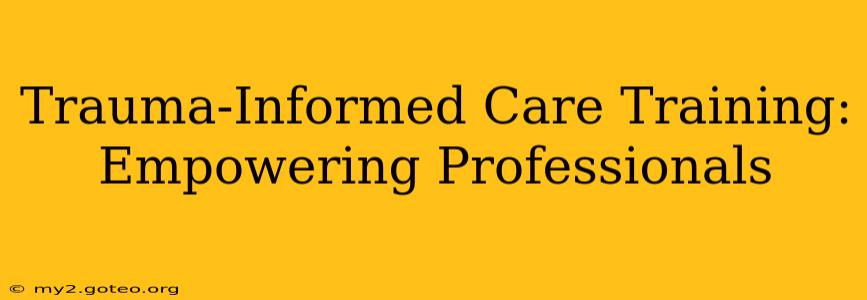Trauma-informed care is more than just a buzzword; it's a fundamental shift in how we approach healthcare, education, social work, and other helping professions. It recognizes the profound impact of trauma on individuals and emphasizes creating safe and supportive environments that prioritize healing and resilience. This article explores the importance of trauma-informed care training and answers frequently asked questions about its implementation and benefits.
What is Trauma-Informed Care?
Trauma-informed care is an approach to engagement, assessment, and intervention that recognizes the pervasive nature of trauma and understands potential paths for recovery. It acknowledges that trauma can significantly impact an individual's emotional, psychological, and physical well-being, influencing their behaviors, relationships, and ability to function in daily life. The core principle is to avoid re-traumatizing individuals through practices that are insensitive or trigger past experiences. Instead, it focuses on creating environments that are:
- Safety: Prioritizing physical and emotional safety for individuals.
- Trustworthiness and Transparency: Building trust through open communication and clear expectations.
- Choice, Control, and Collaboration: Empowering individuals to make informed decisions and participate actively in their care.
- Empowerment, Healing, and Recovery: Focusing on strengths and fostering a sense of hope and self-efficacy.
What are the Key Components of Trauma-Informed Care Training?
Trauma-informed care training provides professionals with the knowledge and skills necessary to implement this approach effectively. Key components typically include:
- Understanding Trauma: Learning about different types of trauma, their effects on the brain and body, and the various ways trauma can manifest.
- Recognizing the Signs and Symptoms of Trauma: Developing the ability to identify trauma-related behaviors and emotional responses in individuals.
- Creating Safe and Supportive Environments: Learning strategies for establishing trust, promoting safety, and fostering a sense of control.
- Trauma-Informed Assessment and Intervention: Developing skills in conducting trauma-sensitive assessments and tailoring interventions to individual needs.
- Self-Care and Compassion Fatigue: Learning strategies for managing stress and preventing burnout, which are common among professionals working with trauma survivors.
What are the Benefits of Trauma-Informed Care Training?
The benefits of trauma-informed care training extend far beyond the individual level. Organizations and communities also reap significant advantages.
- Improved Client Outcomes: Trauma-informed approaches lead to better engagement, reduced symptoms of distress, and improved overall well-being.
- Enhanced Professional Practice: Training equips professionals with the skills to work effectively with individuals who have experienced trauma.
- Increased Staff Satisfaction: Supporting staff through training reduces burnout and improves morale.
- Stronger Organizational Culture: Creating a trauma-informed culture fosters a more compassionate and supportive work environment.
- Reduced Costs: Early intervention and effective support can reduce the long-term costs associated with trauma-related issues.
Who should attend Trauma-Informed Care Training?
Trauma-informed care training is beneficial for a broad range of professionals, including:
- Healthcare providers (doctors, nurses, therapists)
- Educators (teachers, counselors, administrators)
- Social workers
- Law enforcement personnel
- Child protective services workers
- Community support workers
How long does Trauma-Informed Care Training take?
The duration of trauma-informed care training varies greatly depending on the program's depth and focus. Some workshops may be a single day, while others may be spread across multiple days or weeks. Many organizations offer online and blended learning options, catering to different schedules and learning styles.
What are the different types of Trauma-Informed Care Training?
Training programs often specialize in specific populations or settings. Some might focus on working with children, while others might focus on adults or specific types of trauma. The curriculum varies depending on the specific training provider.
Is Trauma-Informed Care Training effective?
Extensive research supports the effectiveness of trauma-informed care in improving outcomes for individuals who have experienced trauma. Studies demonstrate its positive impact on reducing symptoms of post-traumatic stress disorder (PTSD), improving mental health, and enhancing social functioning. The effectiveness of the training itself relies on its quality and the commitment of the organization to implement the principles learned.
By implementing trauma-informed care, we can create safer, more supportive environments that foster healing and resilience. This approach is not just a best practice; it's a moral imperative. Investing in trauma-informed care training is an investment in a healthier and more compassionate future for everyone.

